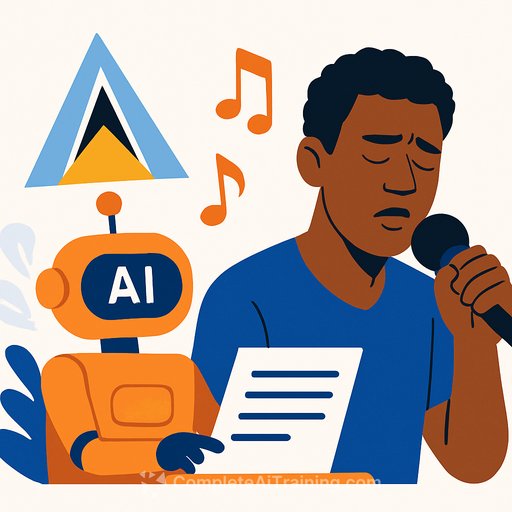The rise of AI and the erosion of individual voices
Across Saint Lucia and beyond, a sameness is creeping into public writing. Emails, speeches, reports, even captions sound polished yet strangely distant. Many point to AI tools as the silent editor smoothing everything into the same voice.
The issue isn't AI alone. It's how we use it-and how quickly we accept the first draft it produces.
Why everything is starting to sound the same
"You may have noticed that responses you're getting are starting to look or sound alike," says Jim Joseph, managing director of MAP IT Solutions Ltd. He compares it to predictive text-only now the system predicts entire phrases and paragraphs, not just the next word. That's how large language models work.
Joseph's point: the tech is fine; the process is weak. Vague prompts lead to generic drafts. Taking the first answer turns you into a copy of everyone else. "It's a dialogue. The human has to be the final authority."
What writers are losing
Saint Lucian writer Amanie Mathurin sees the fallout daily. "People are trying to sound extremely knowledgeable and professional but pay little attention to sounding relatable, authentic, or unique." It reads "mechanical," even when the sentences are clean.
Worse, the language can feel culturally off. Stock phrases drop into contexts where they don't belong. AI can't yet catch the rhythm of Kwéyòl in a conversation or the way Saint Lucians use irony and humor to build a point. That texture matters. It's how readers know a human is speaking. For context, see Kwéyòl.
The cost of generic writing
In speeches and stories, sameness is fatal. The ideas may be correct, but if the writer and the audience are missing from the piece, it falls flat. Buzzwords replace insight. Clichés crowd out feeling.
Good writing doesn't just say the right thing-it says something real. That requires voice, detail, and decisions only a writer can make.
Practical ways to keep your voice (and still use AI)
- Define the goal before you touch a keyboard. Who is this for? What should they think or do after reading?
- Gather raw material first: quotes, anecdotes, local references, data. Feed AI substance, not vibes.
- Write a quick, messy outline in your own words. Then ask AI to strengthen, not replace, your thinking.
- Set constraints: word count, tone, audience, banned phrases, and required local details.
- Force specificity: require examples from Saint Lucia, references to place, and language people actually use.
- Use AI as critic and editor: ask for blind spots, better structure, and tighter sentences.
- Do a human pass last: read aloud, cut filler, check cultural nuance, and fix anything that "sounds like a press release."
A simple prompting workflow for writers
- Context: "You are my writing assistant. I'm drafting a 700-word speech for a Saint Lucian audience about [topic]. Audience: [who]. Outcome: [what I want them to think/do]."
- Voice pack: Paste 2-3 samples of your own writing. "Mirror this style: short sentences, concrete examples, no clichés."
- Constraints: "No buzzwords. Prefer active voice. Use local references where natural. Max 2 metaphors."
- Draft request: "Create an outline with 5 bullet points and a one-line takeaway for each."
- Iterate: "Challenge the weakest point. Offer two stronger alternatives with evidence."
- Polish: "Tighten to 600 words. Keep my voice. Replace any generic sentence with a specific one."
- Final pass: You verify facts, adjust tone, add lived experience, and cut anything that feels imported.
Signals your draft reads like a bot
- Over-polished generalities: big claims, few specifics.
- Buzzword clusters and cliché chains.
- Passive voice everywhere, zero decisions.
- Sentences that are long, even, and rhythmically flat.
- Phrases no one in your audience would naturally say.
- Local references that miss the mark or feel pasted in.
When to skip AI
- Poems, eulogies, or moments that demand unfiltered feeling.
- Content about sensitive community issues where nuance is everything.
- Origin stories and personal essays where voice is the point.
Build the skill, keep the soul
The tool isn't the threat-unskilled use is. Prompting is a craft, and editing for voice is non-negotiable. Use AI to think sharper and ship faster, but let your lived experience set the tone.
If you want structured practice with prompts and workflows, explore these resources: Prompt Engineering resources and courses by job.
The goal isn't a perfect sentence. It's a true one-rooted in place, culture, and a voice only you can bring.
Your membership also unlocks:






